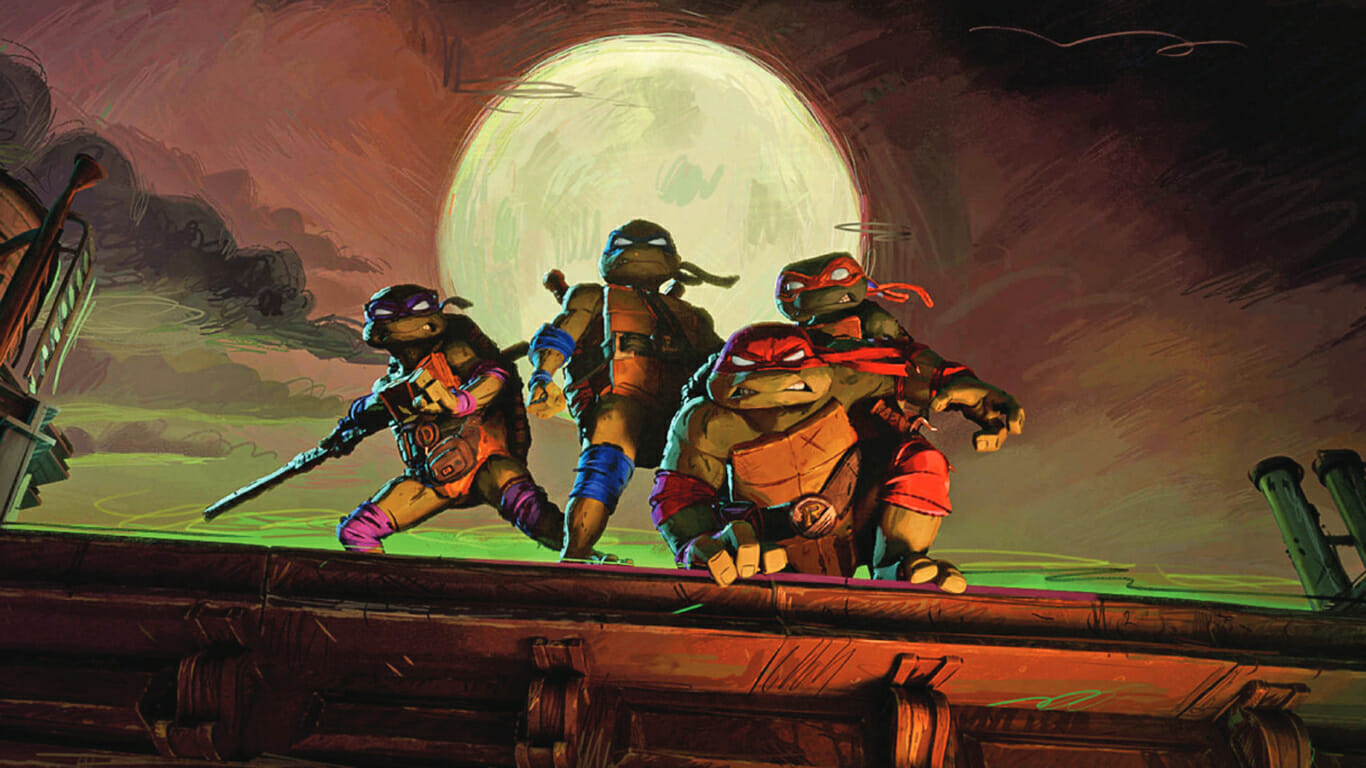This review was written during the ongoing WGA and SAG-AFTRA strikes. Without the labor of the writers and actors on strike, Teenage Mutant Ninja Turtles: Mutant Mayhem wouldn’t exist. Thankfully, most of the film’s writers have shown support for the strikes, so that’s a good chunk of talent on the picket line—though perhaps too many cooks in the screenwriting kitchen.
Our five billed writers are Seth Rogen and Evan Goldberg (the duo behind Superbad, Pineapple Express, and other touchstones of teenage truant ganja chortles), Dan Hernandez and Benji Samit (who previously co-wrote Detective Pikachu), and Mitchells vs. the Machines scribe Jeff Rowe, who serves as Mutant Mayhem’s director. Tasked with rebooting the turtles for a new generation, the team hits square one with an origin story: in the fray of an armed raid, a mad scientist’s mutagenic ooze is lost down the drain, transforming four baby turtles and a fatherly rat into a clan of sewer-bound mutants. Mr. Rat (“Splinter” to those who know him and “Jackie Chan” in real life) soon learns that humans lose their cool around giant talking animals, so he teaches his sons ninjutsu to ensure their survival. It’s not far removed from past Turtles lore. You’ll see pieces and retellings of their origin more than twice, but worry not: this is a self-aware reboot, so it’ll joke about rehashing before going and rehashing. Oh, the joys of modern IP—soon we’ll get a Turtles multiverse!
READ ALSO: Read all of Ryan Bordow’s movie reviews here
To be fair, if you’re going to reboot a property in these metamodern times (setting aside the conversation of whether we even should), the self-reflexive comedy route might be your best bet. There’s a certain sense of freedom in acknowledging you’re a cultural object. It lets the script play to the adults without losing the tone of a kids’ cartoon: Mutant Mayhem’s meta jokes (like Splinter learning ninjutsu from old Jackie Chan films) play infinitely more naturally than, say, the 2010s reboot dialing up the turtle horniness. A team of talented, culturally ingrained screenwriters winking at their assignment is bound to yield some gold. The problem is when they filter their humor through the mouths of their characters (who are, as you may have heard, teenagers).
Mutant Mayhem trades in more pop culture references than any film in recent memory: the characters mention Drake, Beyoncé, The Avengers, Family Guy, the Hollywood Chrises, Godzilla, Shrek, Ratatouille, and a million other relevant things, occasionally multiple times. It’s incessant. But that would be okay—and accurate to teenagers—if the script better captured how they play with pop culture. The brothers never banter over their tastes or coat references in irony; they just name-drop ad nauseam from a seemingly shared brain. When April O’Neil, their first human ally, describes a villain’s plan as “some Megamind/Gru-type shit,” it boggled my mind that the turtles—so apparently meme-savvy—didn’t react in any way to her citing Despicable Me (not to mention a near-obscure DreamWorks joint). The pop culture talk is only halfway there—a skeleton of media awareness without that hyper-involved teenage wit.
And that’s not the worst of the dialogue. The film reeks of Gen Xers writing Gen Z-speak, which is as cringe-inducing as you’d expect. So much of it feels dated already: the Gen Z lexicon is inherently ephemeral, molting and re-norming with every passing trend, so any attempt to harness it is instantly antiquated. The writers speak it so awkwardly that even when they get it right—they use “rizz” and “sus” technically correctly—it just feels like the tryhard uncle managed to find Urban Dictionary. The turtles’ stellar voice cast, all actual teenagers, do a lot to naturalize the dialogue, but not enough to distract from the sense that they’re mouthpieces for 40-year-olds. I know the audience is a new generation, but for authenticity’s sake, maybe a little more “cowabunga” and a bit less twerking next time?
And there will be a next time. Before Mutant Mayhem had even hit theaters, Paramount announced both a sequel and a spinoff show, which is maybe why Mutant Mayhem feels so undercooked. From a narrative perspective, it’s basically a glorified pilot. The director described it as “the ultimate teenage coming-of-age film,” but the characters barely change from beginning to end—mostly their circumstances do. Their internal growth consists of temptations and challenges overcome on a dime: the villain, a mutant fly, wants to enslave mankind, which tempts the human-averse Splinter for about 0.5 seconds before he remembers he’s a good rat, and the turtles, at their lowest moment, just need to remember who they are (and who they’ve been the whole movie) to summon the confidence for a superhero third act. April, tragically underwritten, gets one simple challenge to surmount out of nowhere. It’s all so spontaneous and thin.
But that’s the script, which, despite its many shortcomings, still bursts with levity and sincerity. The real draw is the animation, which mines the much-imitated Spider-Verse but strikes its own oozy character. The colors are grimy, the character designs are gross (even the humans look like warped lumps of clay), and movement is rendered with rough edges intact—rays of light seem to dance at 6 frames per second, endowing the film with scrappy, stop-motiony energy. The frame is always swimming in gorgeous animation, though much less busy than Spider-Verse at its densest—which in some ways I preferred. It’s slightly more legible the first time through, built more for mood than for hiding a thousand easter eggs, and I couldn’t hear the animators crying out in pain (Spider-Verse, conversely, has been accused of overwork by several of its artists).
Mutant Mayhem’s style saves it from throes of amused detachment—and not just the animation; the Reznor/Ross score is spiky and propulsive—but the script works hard to drag it back down. There’s a constant tension between the effort on screen and the very routine story. But you never know: maybe these turtles will hit their stride in the post-sequel TV show.
★★½ (2.5/5)




